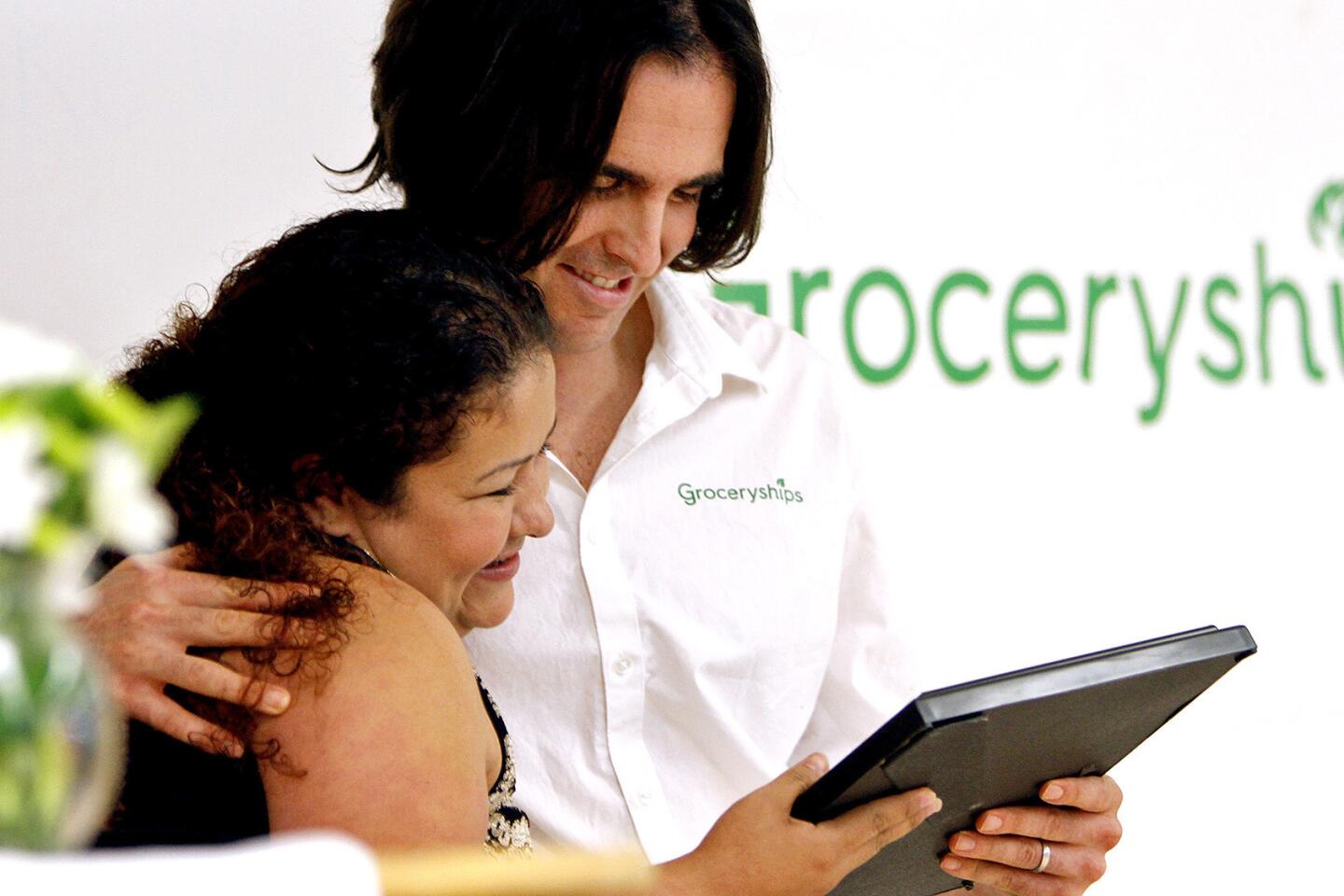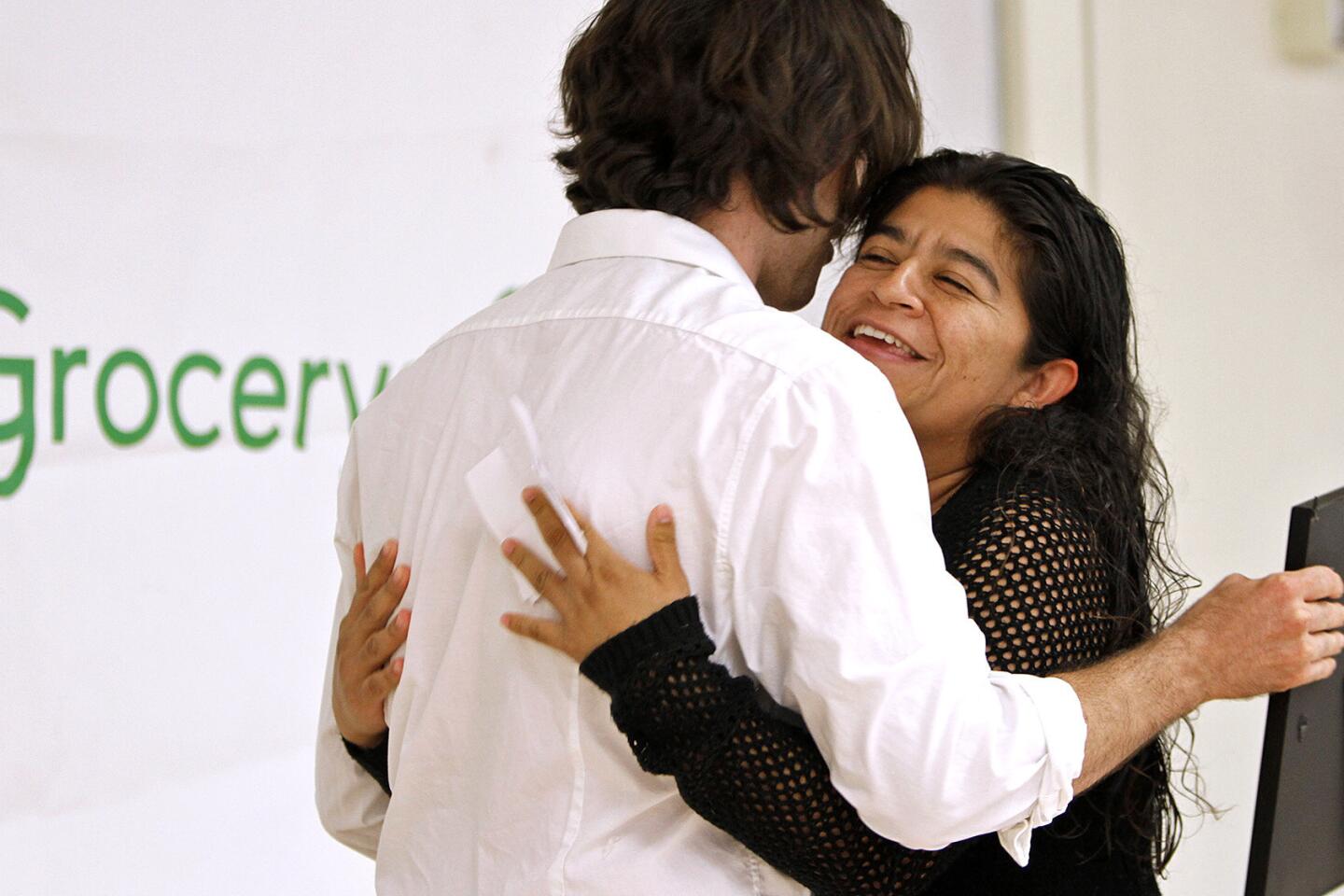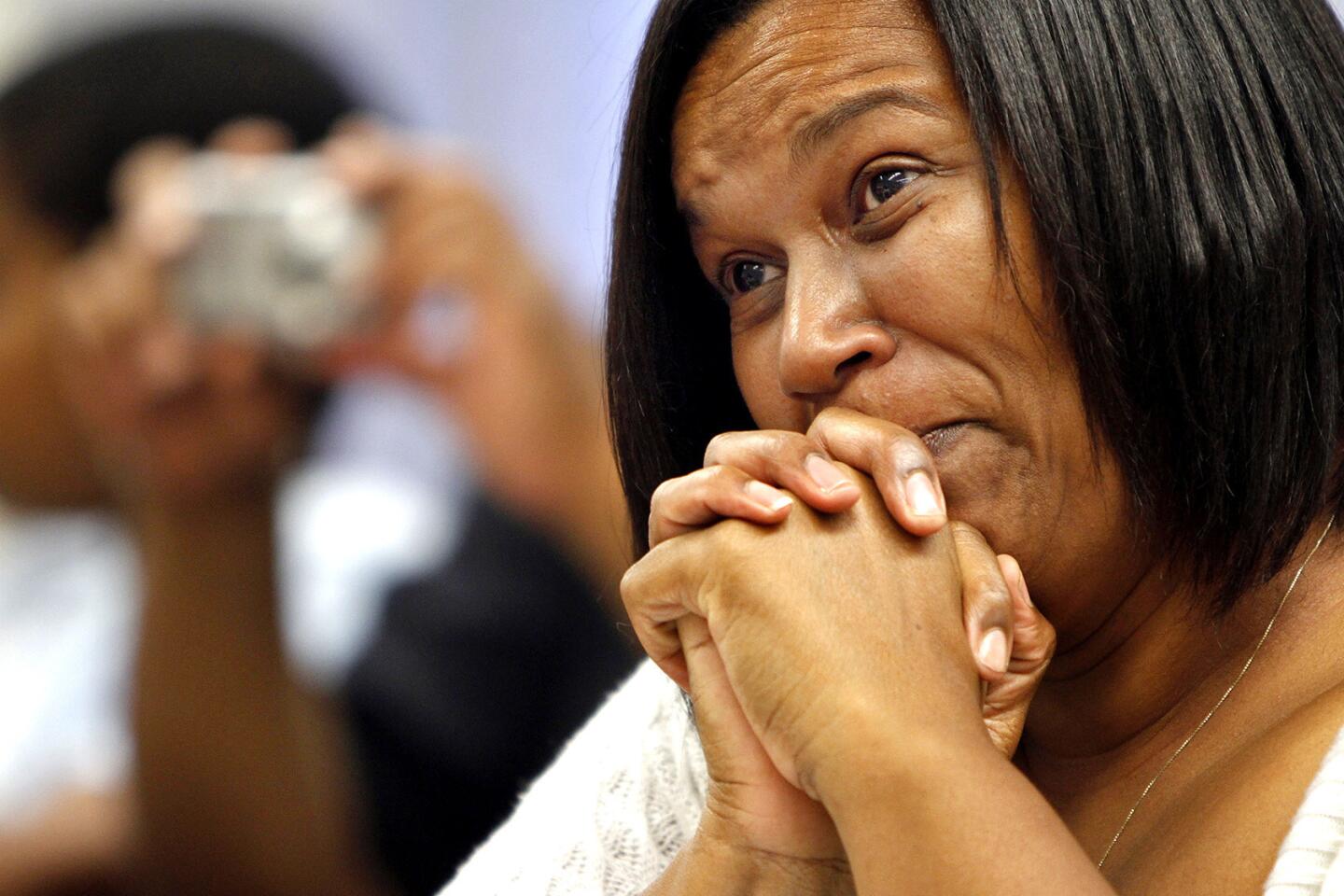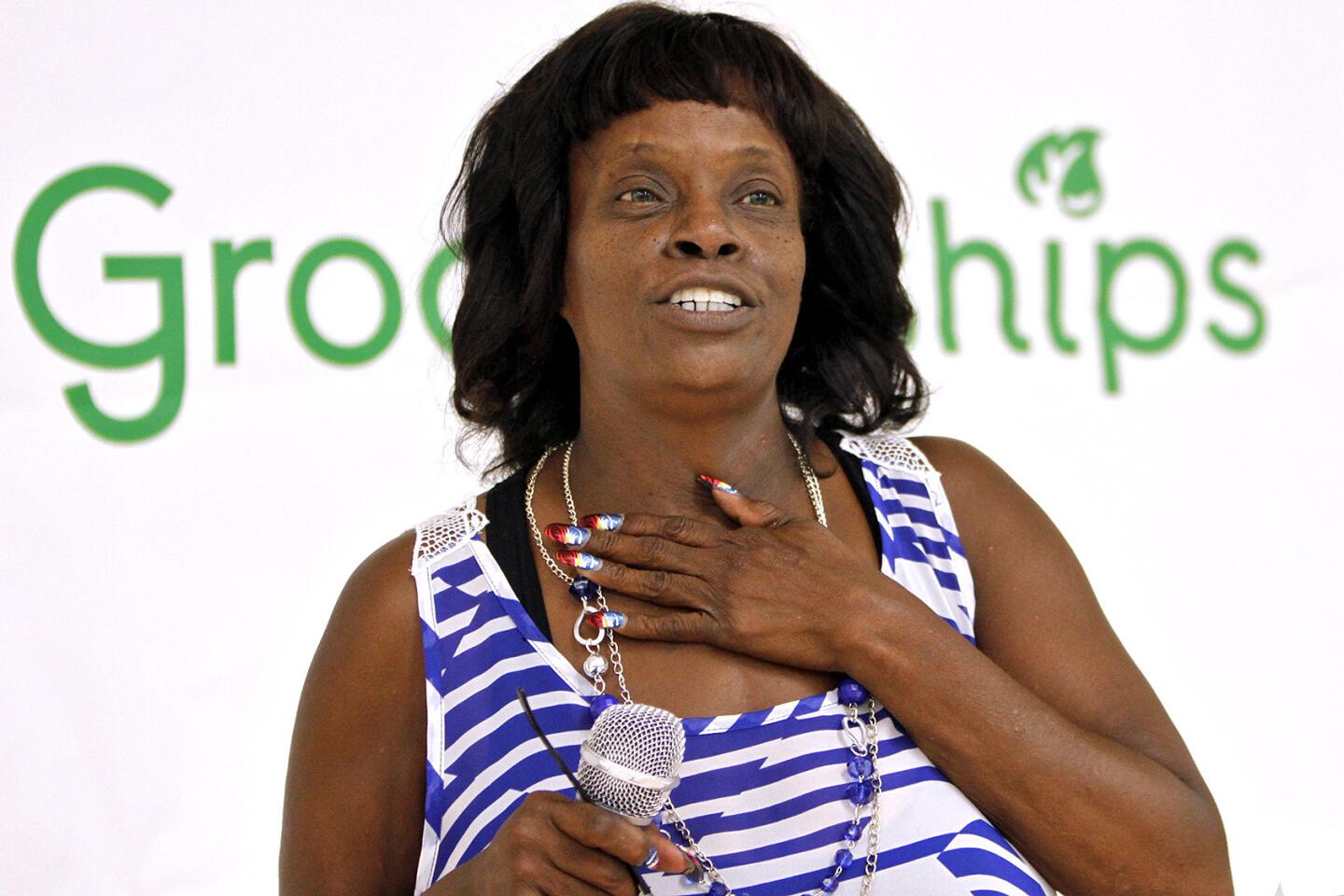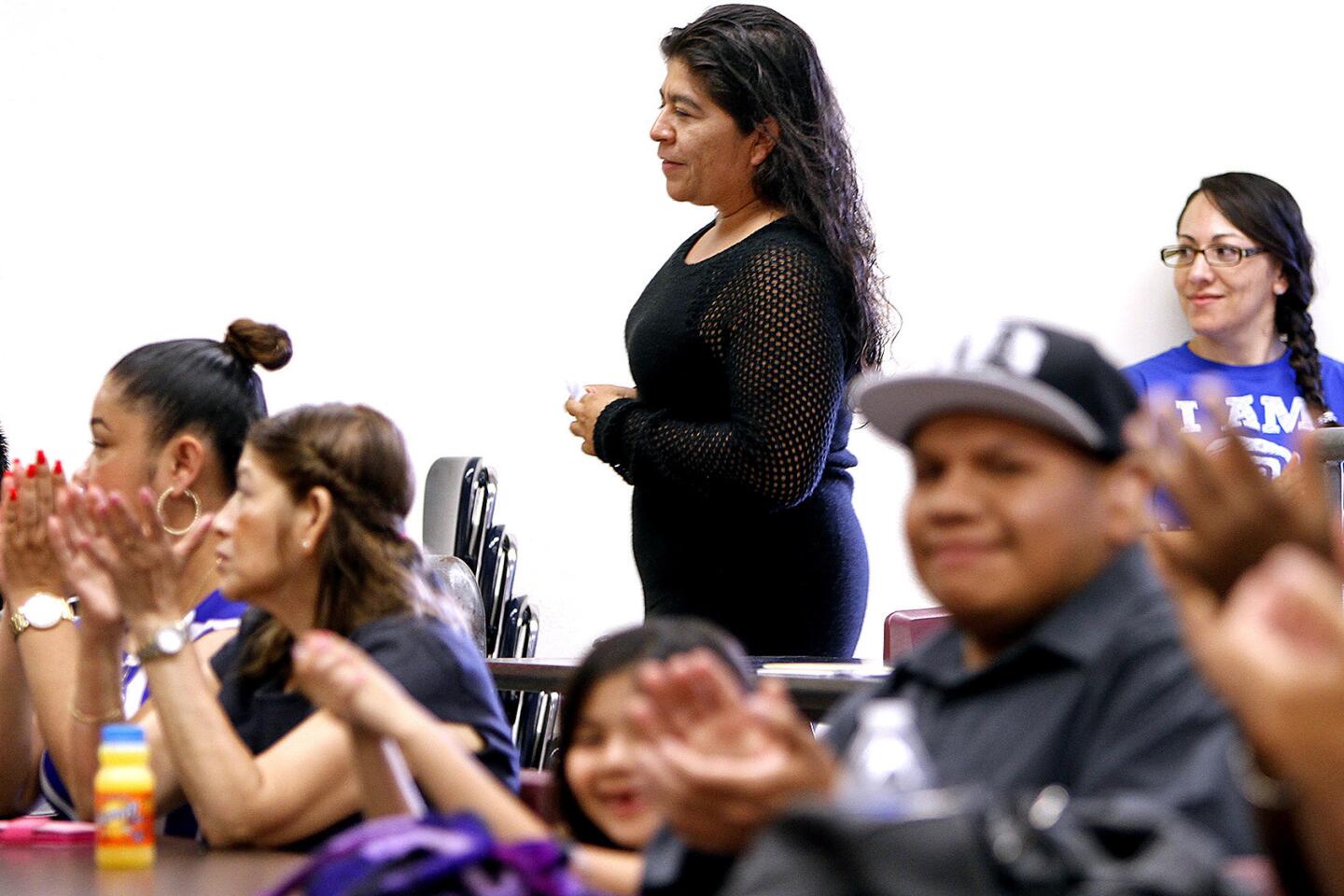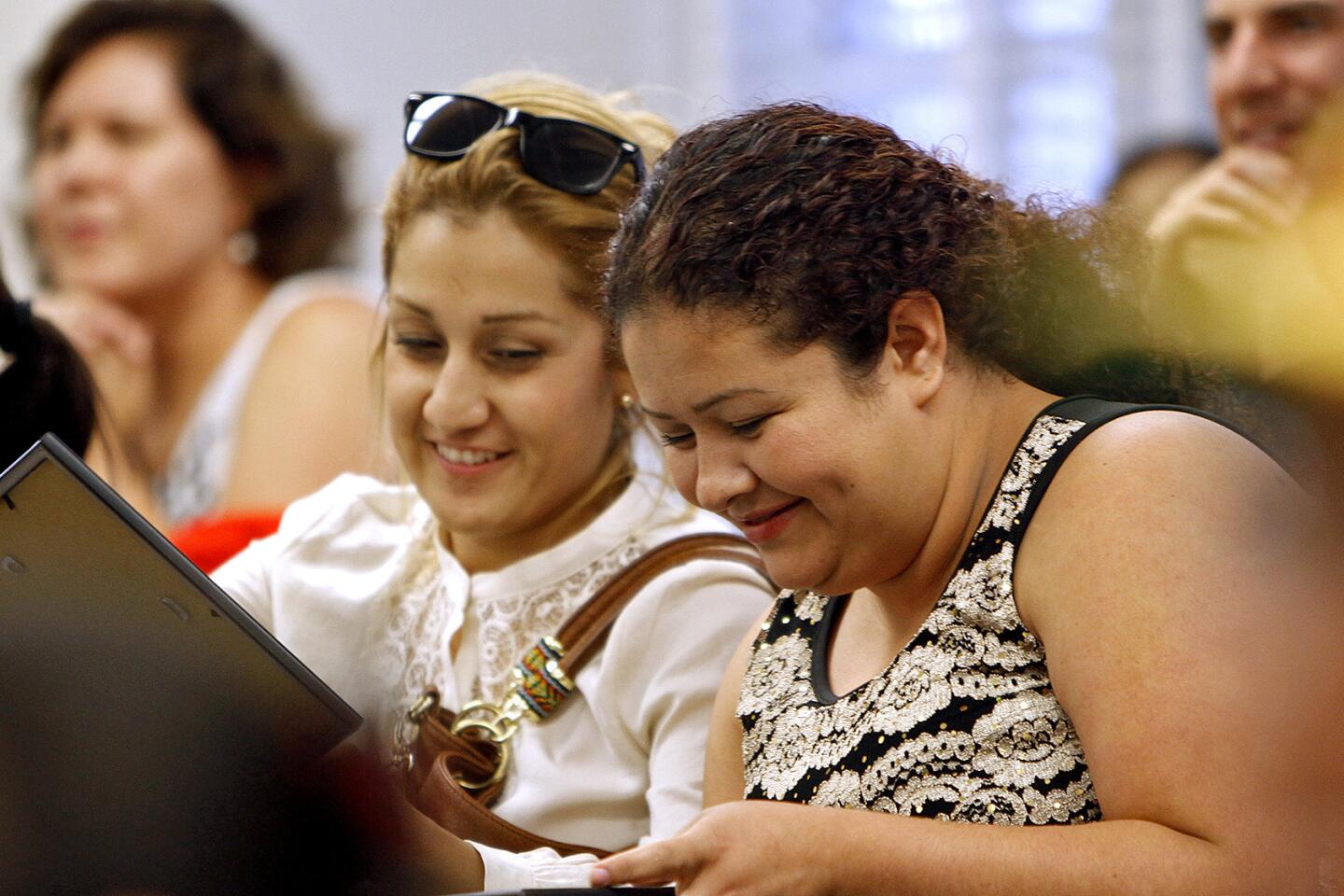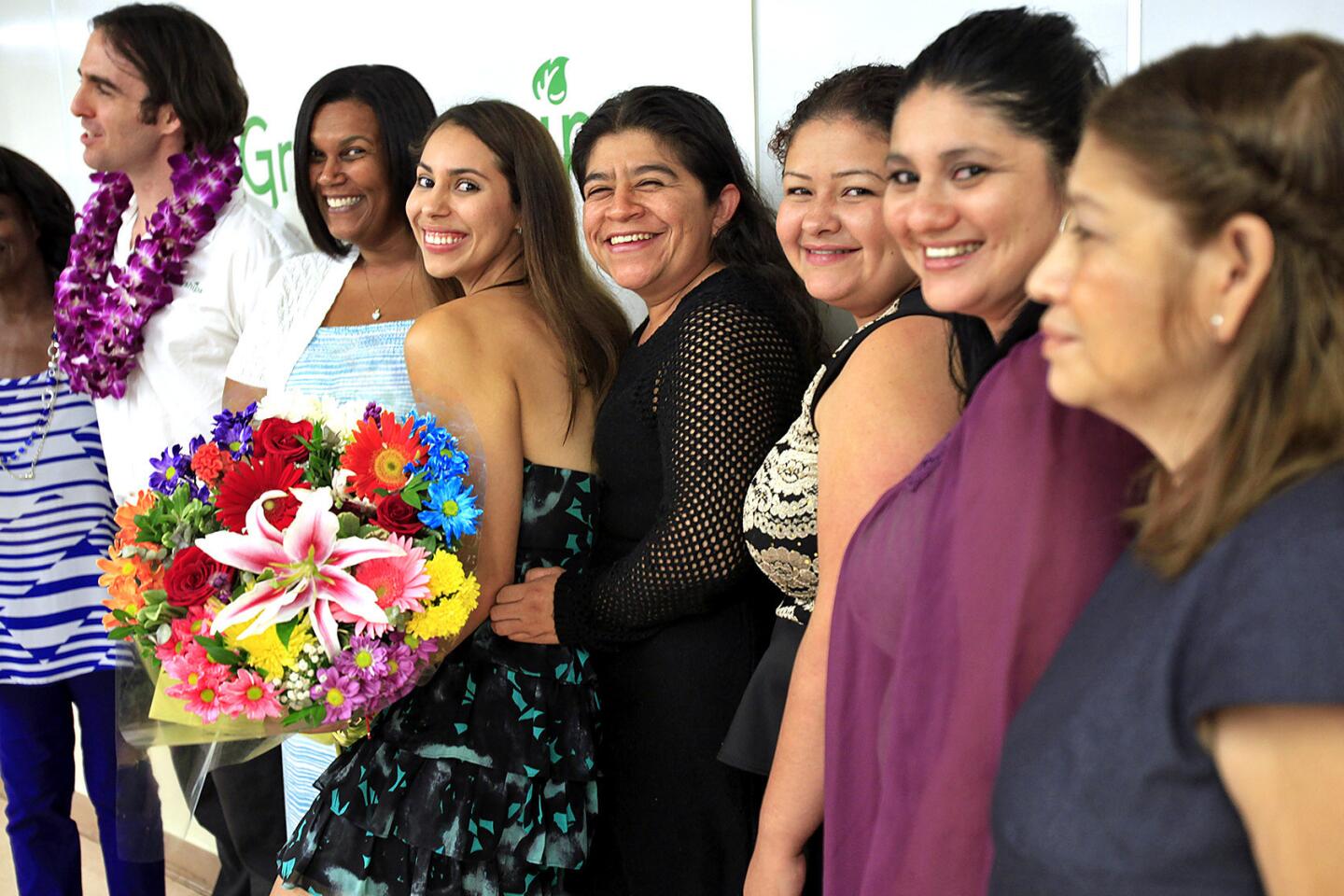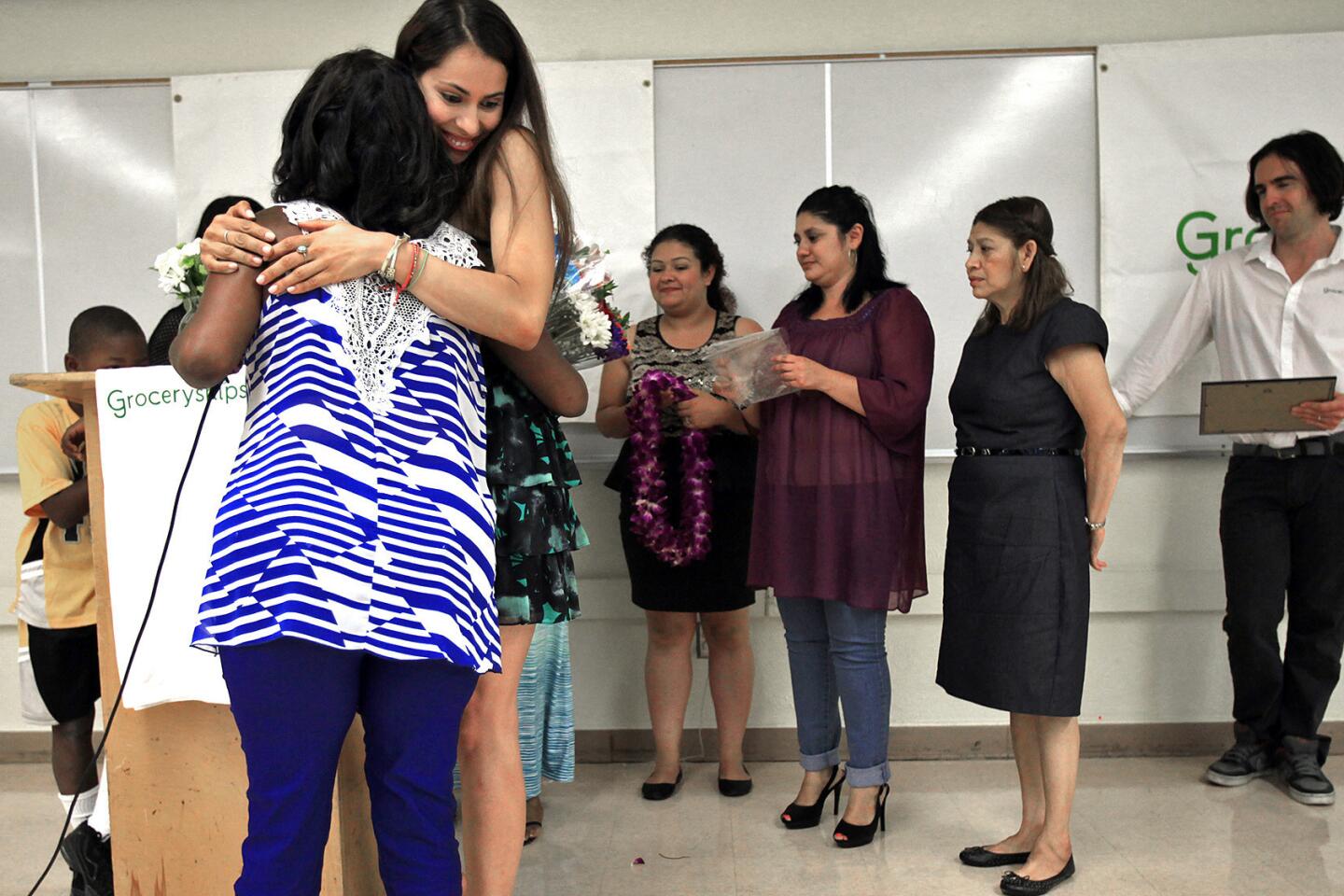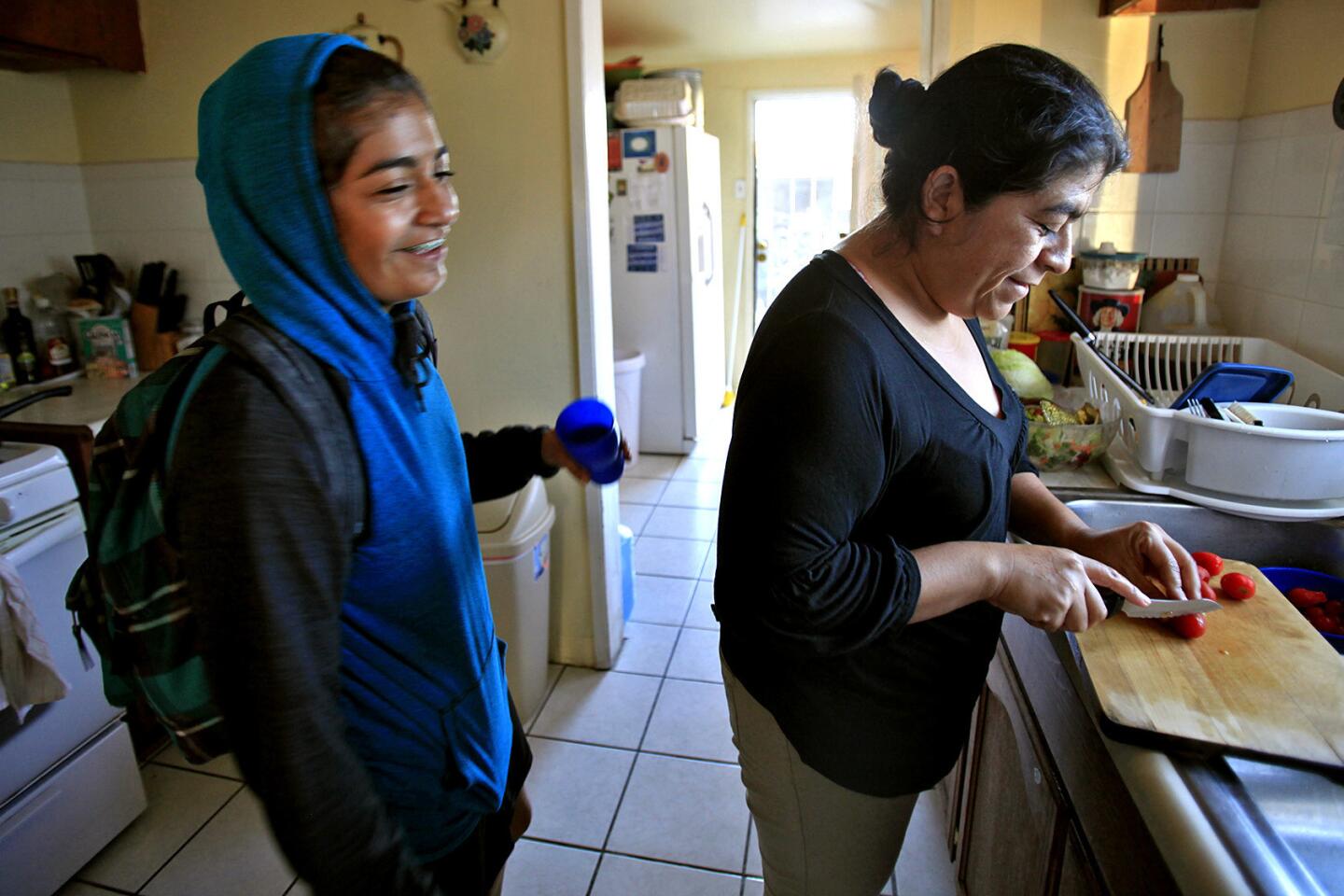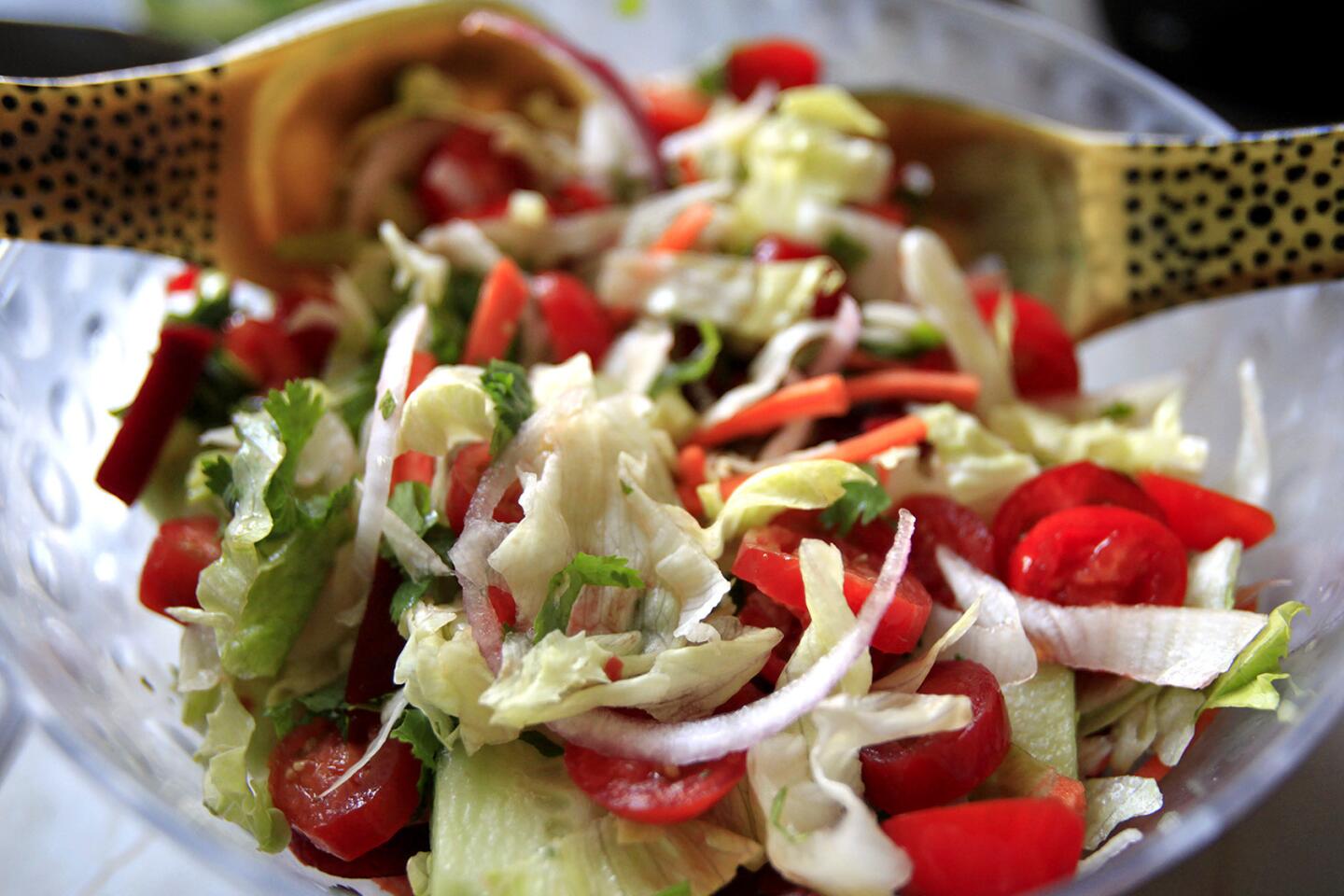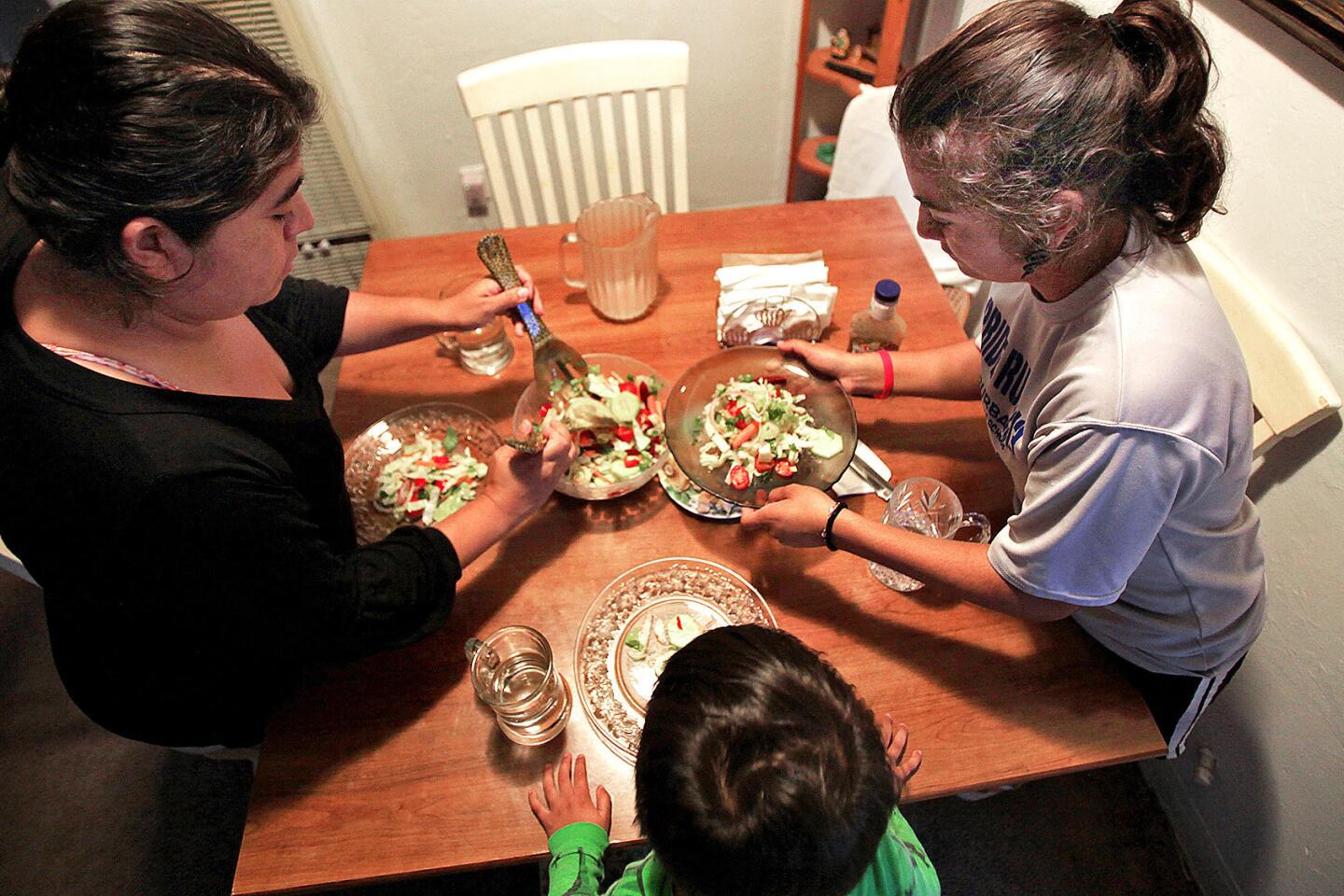Great Read: South L.A. women changed their lives, and it started with food
- Share via
Every Wednesday evening, the women sit in a circle of folding chairs in a bungalow at St. Cecilia Catholic Church in South L.A. There’s always a box of tissues in the center; it rarely goes unused.
They come to talk about food.
They talk about how to make brown rice or cut back on salt. They talk about neighborhoods filled with fried chicken, barbecue, pizza and burger places.
And they talk about how hard it has been, working the overnight shift at Target, to dig yourself and six boys out of homelessness. Or how to react when two boys get robbed of their phones at gunpoint. The fear that you’ll strike your teenager, who seems to be spinning out of control. And what it feels like when your kids say their classmates are calling their mother fat.
They cry with a woman who fears she has cancer, and when she learns she does not. They cry over parents who are dead, over marriages in trouble.
The women are in the pilot group of a program called Groceryships, and they were improbably brought together by a 34-year-old former hedge-fund hotshot who once griped that his $3.4-million bonus was meager. Over the course of six months, they found common ground: Rich and poor had plenty to learn about eating out of emotion, not hunger, and how to reach for health amid an unhealthful environment.
Over those six months, the women become friends in a room they came to call their safe space.
“You can be you in there,” says Juana Madera, 27. “It’s your family. Even better than your family sometimes, because you can express yourself and they won’t tell you you’re wrong. They just listen to you.”
::
Things did not begin well for Groceryships.
Founder Sam Polk had become a media star with a New York Times essay on his addiction to money, his decision to leave Wall Street and his new path. For a year, he gathered colleagues and experts to plan Groceryships, convinced funders of the value of his ideas. He had a website and curriculum, and, finally, working with L.A.’s Promise, a nonprofit working to improve several South L.A. schools, he had eight families in the pilot group.
The program provides each participant family $100 a week on a Food 4 Less gift card for six months. Each family also receives a high-end blender for juicing. The group watches films, gets handouts about nutrition and learns to cook several dozen healthful dishes.
But at that first meeting, the women found it hard to connect to an Ivy League alumnus whose salary easily topped all of theirs combined, who used to spend his evenings in the country’s best restaurants. To counter that, he was humble and open with them about a past that included drinking and drugs. He talked about how he and a sibling were teased at school as the “Pork Brothers” and about a new parent’s fears of being bad at such a crucial job.
Still, the women spoke just a word or two. And he let them go early, because he couldn’t fill two hours.
Helen Langley, easily the most loquacious member of the group, says, sure, she judged: “Who are these white people coming to South-Central? What do they want if they’re not the police or a social worker? We had to feel them out.”
It was Langley, however, who also helped change the tenor in the room when, on the third night, she told the circle that it was the first time in 20 years that someone had asked her how she was doing.
“I took a breath and opened up,” she says. “I don’t have a safe place. ... We made this a safe place.”
::
Langley wasn’t much interested when she heard about Groceryships.
“It didn’t really appeal to me. ... I was tired of doing change,” the 54-year-old says. She had just cared for her mother until her death from cancer, which came not long after her father’s death. But the kids — she’s raising six nieces and nephews because their parents, she says, are troubled — “kept harping on me to do it.”
So she filled out the form, and at her interview she became intrigued. “I got these kids, and I got to live long,” she says.
Langley and the children live in her childhood home, a big yellow house filled with family photographs and cozy pillows. She was the seventh of 13 kids; her parents were loving but distant. (When she took to hugging them, she says, they were “like ironing boards.”) She worked for 23 years for the school board and recently has become a poet and a painter.
She has dieted plenty. She lost more than 100 pounds with Weight Watchers, “and that lasted like two damn weeks,” she says.
Her family’s food, she says, was unhealthful, but they didn’t realize it. Big pots of rice and beans. Fried chicken.
But her family took enthusiastically to a recipe for a breakfast bowl of brown rice, cinnamon, nuts and fruit. They eat it all day, Langley says. One Sunday, she brought it to her minister brother’s congregation, replacing the usual bacon and eggs. The dish was a hit.
Langley says she has started to think about what makes her happy. “This class has helped me put my fears up front and look at them,” she says. She has started to date, and now when she feels overwhelmed she goes for a drive and sometimes walks along the beach.
Her family likes the change they see: “It’s all about me, and they know it now,” she says. “I’m doing a lot to make us happy, make me laugh.”
::
The women sometimes bring husbands or children, but it is clearly their world in that room.
Each week, the first hour focuses on cooking, food labels, marketing, shopping strategies. The second hour turns to the intangibles of emotional eating, feeding children, food addiction. But life bubbles over into both hours.
Eara Pollard, 45, describes walking the aisles of Smart & Final, putting cookies or chips in her cart and later taking them back out. “I kept putting stuff in and taking stuff out. I felt like everyone was watching me.”
A few months in, Pollard offers this assessment: “I might not be where I want to be, but I looked in the cabinets and we don’t eat like we used to.”
No one is considered an expert, though Polk and Angela Carrasco, Groceryships’ program director, teach. One night, Polk surprises the room with the idea that crackers often are high-fat. He says that some foods have a combination of fat, salt and sweet that trigger unhealthful eating.
“It’s not that they are bad; it’s just that you are powerless against it. Like cocaine,” he says.
“Cinnamon Toast Crunch. That’s cocaine,” Langley chimes in.
Eventually, the women join Polk in his dreams for Groceryships. What about a building, with room for a garden? What about showing a documentary like “Fed Up” to the community? Free weekly yoga classes start, despite some digs that yoga is something white people do. About half the women quickly are infatuated.
The program is a bit of “Food, Inc.” meets Native American healing circles — a marriage of practical and spiritual, inspired by Father Greg Boyle and his Homeboy Industries anti-gang programs.
Polk acknowledges that six months is short. “In a culture that’s saying eat this, eat this. ... It’s a journey that takes years, decades.”
But these first steps have been heard: The second group, 10 families, has been chosen, and a group also is to start through Homeboy Industries. Polk is at work to find a way to incorporate farmers market foods rather than just grocery store cards. There’s discussion of a group in New York City soon.
“Most people don’t have a place to talk about their struggles. It was important to have a place to talk with no fear of response or retort,” Polk says. “The last thing I want is advice.”
::
When this pilot group — the OGs, as they call themselves — came to the end of its six months, one of eight had dropped out. The others promised to keep going to the meetings and be mentors to new groups, and to stay in touch, as if they were leaving junior high.
“Graduation” was held at Manual Arts High School, in a room decorated with flowers, streamers and framed portraits of each of them. Instead of the leggings and T-shirts they wore to meetings, they put on makeup and dresses, curled their hair and did their nails. About 75 friends and family came. Rep. Karen Bass (D-Los Angeles) spoke and brought each of them certificates from Congress marking their achievements.
Groceryships, said Yohana Funes, 34, changed her life.
“They have made me feel physically, mentally and emotionally beautiful,” she said, this night wearing her long hair down and a lovely body-hugging black dress. “Before, my children were my circle of life. Now I realize it’s all of us together.”
Before Groceryships, food cost $125 a week for her family of five. Funes now buys less processed food, no red meat, little juice. She substitutes avocado for mayonnaise. Her bills have dropped. “We used to have to take stuff out of the cart because we didn’t have enough money. Now we have extra.”
At the ceremony, each woman spoke, with lots of tears — and no communal tissue box in sight.
More to Read
Sign up for Essential California
The most important California stories and recommendations in your inbox every morning.
You may occasionally receive promotional content from the Los Angeles Times.
